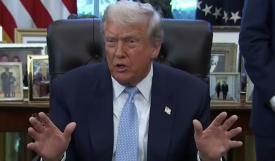Trump Claims Millions of COVID-19 Cases in the US a 'Badge of Honor'
The United States President Donald Trump called the country's world topping numbers of COVID-19 cases a "badge of honor" during a Tuesday press conference. He claimed the increasing number of cases is evidence that U.S. health officials are testing more people.
During the conference, Trump claims the country conducts more coronavirus testing "than anybody else." He argued testing only a million people instead of 14 million would record far few cases.
"I don't look at that as a bad thing. I look at that in a certain respect as being a good thing, because it means our testing is much better," the president said. "So, I view it as a badge of honor."
According to the COVID Tracking Project, the U.S. government has performed over 12,647,791 tests as of Thursday. The country still faces shortages in testing supplies following months of hurdles in development and access.
According to Our World in Data, the U.S. has carried out more tests by volume than any other country. However, it is not the first in the world on a per capita basis. Globally, the United States ranks 16th in terms of tests per thousand people. The country is ahead of South Korea but behind New Zealand, Russia, and Canada.
Data from the COVID Tracking Project showed American health officials conduct more than 300,000 tests each day. Ashish Jha, Harvard's Global Health Institute director, said 900,000 tests every day are needed to safely open up the country again.
At a Senate hearing last week, Republican Mitt Romney said the country's testing is "nothing to celebrate" as it lagged in February and March while other nations tested people aggressively to flatten the curve. He cited data where the U.S. was shown to have only conducted 2,000 tests by March 6 while South Korea had performed 140,000.
Despite the increase in national testing, health experts argue not enough is being done for states to safely reopen their economies. A new report released Wednesday claims coronavirus testing in the country is disorganized and uncoordinated.
Researchers at the University of Minnesota said the tests are not enough to base most decisions on, including reopening schools and letting employees go back to work.
Mike Osterholm, the head of the institution's Center for Infectious Disease Research and Policy (CIDRAP), claims the number of tests reported by states and Washington shows only part of the country's COVID-19 situation. He said the data is inaccurate primarily due to the public health system being overwhelmed with coronavirus patients.
The CIDRAP report suggested using diagnostic tests for disease surveillance, contact tracing, and monitoring frontline workers at high risk for exposure to the disease. The team recommended against testing suspected coronavirus patients in hospitals, schools, and other low-risk settings. It also suggested avoiding giving antibody tests to decide who can go back to work.
"We believe that greatly expanding SARSCoV-2 testing is a critical element in our response to COVID-19," the report reads. "For testing to be maximally effective, coordination across the system and across jurisdictions is necessary."Want to read more? Check these out:
Subscribe to Latin Post!
Sign up for our free newsletter for the Latest coverage!
© 2025 Latin Post. All rights reserved. Do not reproduce without permission.













